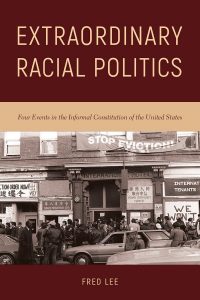Chang: Fred, congrats on your book. It’s beautiful! Can you share the main contribution of your book?
Lee: The main contribution of Extraordinary Racial Politics is to show how political theory can be done somewhat differently. To simplify just a bit: the predominant mode of doing political theory is to closely-read ancient Mediterranean, modern European, and contemporary “North Atlantic” political thought. The book does some of this kind of work in relation to Hannah Arendt and Carl Schmitt, two “canonical” Euro-modern thinkers. That said, I am not a particularly close reader, as compared to political theorists who truly dedicate themselves to interpreting, say, Arendt.
As you will see in my book, I am far more interested in thinking about events, as in worldly occurrences and—more technically—constitutive ruptures. More specifically, I am interested in how events of U.S. racial politics, such as the 20th c. Japanese internment or the 19th c. Amerindian removals, play an outsized role in affecting and shaping the entire United States polity. I argue that racialized events are a privileged point of access into U.S. politics and, indeed, into the very heart of “the political.” That is to say, race is a preeminently and even exhaustively political phenomenon; put another way, race is not only ultimately, but almost exclusively political. The paradigmatically political character of race, I suggest, appears most clearly in extraordinary racial politics.
Chang: Racial formation theory is a centerpiece in our field. What was it that first inspired your work on rethinking this core theory?
Lee: A number of (pseudo-)problems, which led nowhere and which I won’t discuss here, drove me to rethink racial formation theory. However, as I escaped these dead ends, I came to see an actual problem—namely, that racial formation theory is highly focused on ordinary politics, that is, institutionalized politics (e.g. legislation, elections) and everyday politics (e.g. reiterative articulations, cultural remembrance). This assessment applies somewhat to Michael Omi and Howard Winant’s Racial Formation in the United States, the classic reference on this topic; it applies all the more to ethnic studies as cultural studies/production, “post-structural” theory, and popular historiography (e.g. the people’s history of…). Racial formation theory, on the whole, assumes a process-based “ontology” that occludes, limits, or forecloses the possibility of thinking “the event.”
Now, as I acknowledge in the book, we have good reasons to pay attention to long-duration and extended, reiterated and negotiated processes. For one thing, such processes make up the place where everyday people have acted meaningfully; for another, such processes constitute the very texture of the great majority of political experiences. Yet the everyday racial politics of quotidian life and institutionalized power are only one half of the racial formation story; racial formation also includes the extraordinary racial politics of mass mobilizations and state crises, which—to refer to more cases from the book—converge in 1950s-1970s civil rights and allied “people of color” movements.
To be clear, my point is not that everyday racial politics are unimportant, trivial, or unreal. The point is rather to think both the difference and the relationship between the ordinary and the extraordinary. The basic contention is that extraordinary racial politics emerge out of and break from ordinary racial politics, yet also come to reconnect with and reset ordinary racial politics.
Chang: Describe a hurdle you faced in writing this book and how you dealt with it? Would you do anything different were you to do it again?
Lee: The project started out as a dissertation. In dissertation form, the project tried to cover more ground than could possibly fit in a monograph. So, my biggest challenge was to figure out what I was trying to argue (see above) and to pare down accordingly.
As I was working on the book, I was simultaneously publishing articles, some of which showed my appreciation for everyday politics (see my article “Fantasies of Asian American Kinship Disrupted”) and some of which expressed my dissatisfactions with political science (see my article “The Contours of Asian American Political Theory”). If I could “do it again,” I would have better integrated these diverse research areas. The book project could have benefited from interdisciplinary critiques of disciplines and focused analyses of quotidian politics, for instance.
Chang: How has work on this book bled into other projects? What are your future research plans?
Lee: My next book project will continue to thematize extraordinary politics. The second book, however, will be far less U.S. centric and somewhat less nonfictional than the first book. More positively stated, the new book will establish an Asian Americanist analytic of Asian science fiction.
As an Asian Americanist/political theorist, I am considering how Korean filmmaker Bong Joon-ho and Chinese novelist Liu Cixin imagine unprecedented responses to globalized, life-threatening crises. In movies like Bong’s Okja, for instance, such responses are ethical and political; in novels like Liu’s The Dark Forest, by contrast, such responses are scientific and technological. I will use Liu and Bong to back into debates about political science methods, as Bong is akin to interpretive social scientists oriented to meaning-generating actions, whereas Liu is akin to naturalistic social scientists oriented to ruled-governed behaviors. At the same time, I am wondering how Asian American political theory (as a variety of Asian diasporic thought) could reach or rework Liu’s, Bong’s, and other Asian sci-fi works.